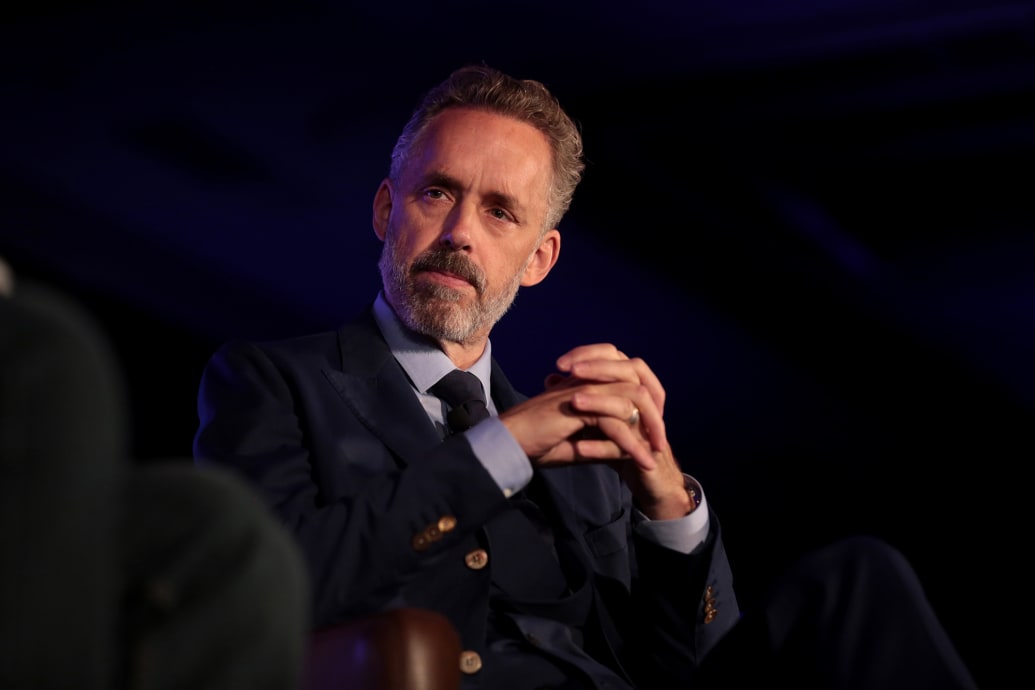Get more news and opinions in the twice-daily Beast Digest newsletter. Don’t miss the next big story, .
Nevertheless, during this high noon of Jordan Peterson’s cultural influence, there were two significant appearances. One was at Oxford, where he held forth before a receptive audience, in the heart of the academic establishment.
The second, and for me the most crucial appearance around this time, was when he joined the actor and comedian Stephen Fry in a Munk debate against New York Times journalist Michelle Goldberg and distinguished academic and author Michael Eric Dyson, to discuss whether political correctness was an enemy of free speech.
It stood out as a unique opportunity: political correctness critiqued through an intellectual collaboration between a self-described “liberal of the most milquetoast variety” in Stephen Fry—who was trying to distinguish between the robust, relatable, and decent elements of liberalism and the strident, flakier excesses of identity politics—and a self-proclaimed “classic British Liberal” in Peterson—challenging political correctness from the perspective of someone bristling at compelled speech and academic activism.

Jordan Peterson speaking at the 2018 Young Women’s Leadership Summit hosted by Turning Point USA in Dallas, Texas.
Gage Skidmore
The promise of such a collaboration, and its effectiveness and coherence on stage, was enormous—an ideological coalition that, if properly followed up on or expanded with multiple iterations of other partners and crossovers, could have brought to bear the intellectual prowess and energies of liberalism onto the more prissy extremes of identity politics and political correctness, and made the left, as a broader idea, more palatable to the mainstream.
As it happened, shortly after these appearances, Jordan Peterson was faced with a string of crises. After his wife Tammy was diagnosed with a rare form of kidney cancer, he was prescribed benzodiazepines to quell his anxiety, only to find himself dependent, and critically sick.
His return was gradual, but he found himself, in his own words, forgiven by his audience. “Here I am this guy, I’m a clinical psychologist, I got tangled up with benzodiazepines. I’m talking to people about getting their house in order, and things collapse around me.” He approached his return with the hypothesis of “including myself in the audience of reprobates to whom I’m lecturing. I don’t assume that I abide by all these rules. There are targets for attainment, and hopefully, that has protected me at least to some degree, against the perception of undue moral superiority…”
At this point, he had lost much of his luster as a contrarian, which, to a large degree, is reliant, as a trope, on a perception of redoubtable toughness and composure. In some quarters he was being perceived as a bit of a spent force or an eccentric.
He had written a follow-up to 12 Rules for Life that, no doubt personally cathartic and a salve as an academic and expressive exercise, was nonetheless seen by many as him pawing in the same old litterbox. He would sign up to a content distribution deal with conservative media company the Daily Wire, further placing him outside the mainstream discourse, and emphatically cordoning off a left or center-left audience who might retain some interest in his perspectives.
In a novel by Alan Hollinghurst, one character laments of another: “He has become more brutal, more sentimental.” This is an apposite phrase for Peterson, whose personality seemed to maximize, with him, in interviews, coming across as sentimental, maudlin, lachrymose, and easily susceptible to open weeping; but his resentment and invective toward perceived outrages of woke ideology also maximized.
He lambasts liberal politics in Western Democracies, Canada in particular; but his criticisms of autocratic impulses and trends on the right, in the West, are dispassionate and muted, often tweeted out as a subordinate clause amidst some other preoccupation.
For the most part, Peterson now dwells in a limited right-wing and libertarian ecosystem of podcasters and social media.
“For an academic who ought to be scrupulous in his sources, he frequently cites or retweets dubious sites full of spurious facts.”
Elon Musk let Peterson back on Twitter after he had been suspended for refusing to stop misgendering and “deadnaming” actor Elliot Page. His once dynamically formulated grievances in relation to prevailing attitudes around the topic were now almost embarrassingly undermined by truculent language. His posts sometimes positively highlight the plight of young women in Iran and other worthy causes and issues, but are more frequently, and dispiritingly, close to the banal invective laced with hyperbole and cheap sarcasm that can be found practically anywhere.
He tweets to promote a lecture intended to discuss the “undeniable need for fossil fuels, and the toxic underlying nihilism of the ‘climate concerned’ left.” He describes Canadian plans to make all new cars emissions free by 2035 as “Utterly deluded and criminally virtue-signaling,” and exclaims, “Keep your damned hands off my car, Justin Trudeau or face the consequences.” He declares the “Twitter Files” as “truly worse than Nixon’s Watergate.”
Peterson now describes medical specialists working with trans youth—a subject he had only a few years prior argued about uncompromisingly, but on a sound intellectual footing, and with rhetorical control—as “pandering cowardly medical ‘professionals’ utterly inexcusably castrating them,” and labels them “sanctimonious butchers.”
He opted to wear a tuxedo while on Joe Rogan’s podcast, and reappeared on the podcast recently wearing a two-toned devil and angel suit. He tweets at his bête noire Justin Trudeau upwards of three or four times a day. He described Tucker Carlson as having “a streak of comedic genius.”
For an academic who ought to be scrupulous in his sources, Peterson frequently cites or retweets dubious sites full of spurious facts. He retweets an obscure and dubious “scientist” who claims to be peer-reviewed, despite an investigation casting doubt on the validity of the internal review process of the foundation where she posts. He retweets a vulgar, horribly vicious, almost singularly anti-trans site.
In response to a trans ad on menstruation, Peterson tweets, “Where’s Nelson Muntz when you need him,” a reference to the Simpsons bully, who he previously wrote about as a symbolic figure whose bullying provides a necessary corrective to resentful, touchy or effete kids.
Whilst still popular, his shrunken influence on the broader culture and ideological spectrum, maximized resentments and reactive rather than framing or paradigm shifting rhetoric has given him the feel of a public figure who is largely played out.
Occasionally, there will be perspectives that almost hauntingly evoke the globe-trotting figure of a few years back, but he no longer has a claim to being a mainstream, enduring academic provocateur. Instead, he’s become the worst thing a pop-psychologist can be—boring.
Sign up for the Beast Digest, a twice-daily run down on each day’s top stories. Don’t miss out, sign up here.



